Contents
The medicinal properties and contraindications of goldenrod have been fully studied, so the fragrant herb is used in folk medicine. So that a plant with amazing properties does not cause harm to health, you need to figure out how to use it correctly.
Botanical description of the plant
Goldenrod is classified as a herbaceous perennial plant. It can reach a height of 100 cm. It grows in a light forest, on the edge, in a clearing, clearing and meadow. The rhizome is woody and short. Flowers are yellow. Their small baskets are collected in inflorescences. The fruits are cylindrical in shape with ribbed achenes, decorated with brown tufts on top. Flowering occurs in August and September.
Value and chemical composition
The plant is valued for its beneficial qualities. For the preparation of medicinal raw materials, the upper part of the stem, inflorescences and leaves are used. The root system is much less commonly used.
The chemical composition of goldenrod includes:
- flavonoids;
- essential oils;
- coumarins;
- resins;
- tannins;
- acids;
- bitterness;
- traces of alkaloids;
- phytoecdysones;
- triterpenoid;
- saponins.
Inulin is present in the root system, fatty oils in the fruits, galactose, carbohydrates, glucose, and arabinose in the inflorescences.
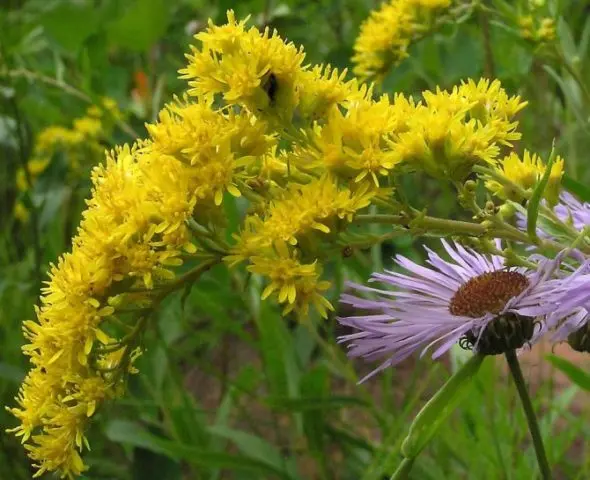
The goldenrod plant grows almost throughout Europe
Useful properties of goldenrod
With proper use, the herb brings great benefits to the body. The plant does the following:
- wound healing;
- restorative;
- antitussive;
- antibacterial;
- expectorant;
- anti-inflammatory;
- diuretic;
- choleretic;
- astringent;
- pain reliever.
Goldenrod regulates the exchange of salts and reduces their amount in the body. Flavonoids, which are part of the plant, contribute to the maintenance of normal capillaries. The herb helps cleanse and heal wounds faster. It is used as a vasoconstrictor.
For men
For men, goldenrod helps in the treatment of prostatitis and urethritis. As part of the herbal collection, it helps to improve well-being with impotence and prostate adenoma.
For women
The plant relieves the condition with candidiasis and cystitis. The essential oils included in the composition contribute to:
- reduction of menstrual and rheumatic pains;
- prevention of skin aging;
- boosting immunity.
Washing with a decoction of goldenrod helps fight acne and tighten pores.
Is it possible during pregnancy and with HB
The plant should not be taken during pregnancy and while breastfeeding. It has a negative impact on the newborn baby and fetus.
At what age can children
Goldenrod should not be given to children under 15 years of age. The plant can adversely affect the health of the child.
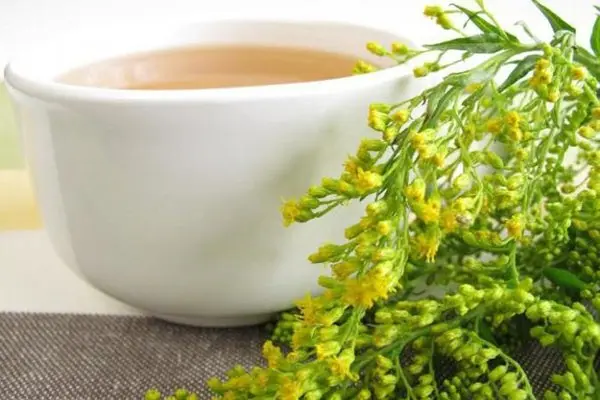
The yellow flowers of goldenrod have a mild fragrance.
What helps goldenrod
Dried raw materials are used for indigestion and impaired uric acid metabolism. The medicinal properties and use of common goldenrod are indicated for:
- festering inflammatory processes on the skin;
- edema;
- kidney disease;
- fractures;
- bronchitis;
- liver problems;
- influenza;
- jade;
- bronchial asthma;
- urolithiasis;
- hypertension;
- colds;
- pain in the abdomen;
- pyelonephritis;
- bladder diseases.
The herb helps relieve gout and rheumatism. Fresh with the help of the plant, abscesses and boils on the skin are treated. Destroy pathogenic microflora.
Gargling with an infusion of the plant cures:
- stomatitis;
- angina;
- gingivitis;
- bleeding gums.
A decoction of goldenrod helps rid the mouth of an unpleasant odor.
The pain of arthritis disappears with the external use of the plant in the form of an ointment or compress. Procedures help soften the skin in case of burns and restore joints faster. Goldenrod is fighting overweight. It regulates genes that control fat synthesis and the size of fat cells.
Goldenrod in folk medicine
The plant is used in folk medicine. Apply the leafy upper part of the stems with inflorescences. Goldenrod has a mild aroma and a spicy, bitter-astringent taste. It is widely used for the treatment of chronic diseases of the kidneys and bladder. It is prescribed for therapy and as a prophylaxis for kidney stones.
Recipes
A poisonous plant in small doses and correctly adjusted proportions gives a positive therapeutic effect in various diseases. Below are recipes for popular goldenrod-based remedies.
decoction
A decoction is prepared on the grass of the plant. Raw material is crushed. Measure out 1 tbsp. l. Pour 220 ml of boiling water. Set to maximum fire. After the mixture boils, simmer over low heat for 5 minutes. Leave for 2 hours, then pass through the filter. Take a drink of 30 ml: in the morning, afternoon and evening.
Means:
- alleviates the condition with urolithiasis and gallstone diseases;
- relieves swelling, as well as inflammation in the kidneys and urinary tract.
To obtain a decoction for a bath, mix 15 liters of water and 75 g of a dried plant. Boil for 17 minutes, then leave covered for 2 hours. Pour into a bath with a water temperature of + 38 ° C.
Healing agent based on goldenrod helps:
- in the treatment of eczema:
- skin tuberculosis;
- skin rashes;
- psoriasis.
Baths can be taken daily.
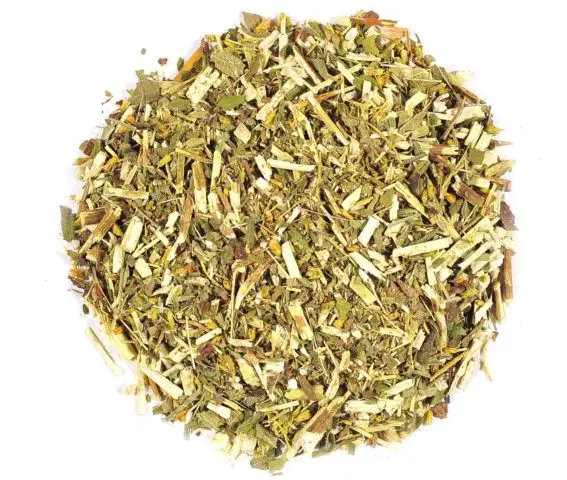
Goldenrod infusions show good results in the symptomatic treatment of diseases
Tincture
To prepare the tincture, use vodka or medical alcohol. An alcoholic drink and a plant grass are combined in a ratio of 3: 1. Leave for 28 days. Periodically shake the mixture. Take 5 ml 3 times a day. The herb in the recipe can be replaced with inflorescences or a mixture of them can be used.
Goldenrod tincture is indicated for digestive and metabolic disorders. Store it in the refrigerator. For the treatment of scurvy, 5 ml of the prepared remedy is added to tea with honey. Take 4-5 times a day.
Tincture on the root of the plant is used externally as a wound healing agent. Apply to ulcers, boils and wounds. 20 g of crushed root is poured into 200 ml of 40% alcohol. Insist 2 weeks.
Infusion
To prepare an aqueous infusion, pour 2 tsp into a glass container. dried goldenrod. Pour 220 ml of cold water, which was boiled and cooled in advance. Leave for 4 hours, then filter. Use the infusion of the plant 60 ml 4 times a day. Reception should be half an hour before meals.
The second cooking option is in a thermos. Maintaining high temperatures for a long time helps to draw beneficial substances from the herb. 250 g of raw materials are poured into 10 ml of boiling water. Leave for 6 hours.
Tea
For brewing a fragrant, healthy drink 1 tsp. dried raw materials pour a mug of boiling water. Close the lid and insist 5 minutes. Use instead of black tea. The maximum allowed volume per day is 600 ml.
The plant contains rutin, a rich source of antioxidants. He helps:
- strengthen capillaries;
- cleanse the body of free radicals;
- reduce acidity.
Goldenrod drink turns out to be pleasant in taste and has a light aroma of essential oil. Daily use promotes weight loss and helps to cope with kidney problems, rheumatism and congestion in the liver.

Tea is brewed from the aerial part of goldenrod
Ointment
To prepare the ointment, dry inflorescences of the plant are used. They are ground in a mortar to a powder state and mixed with cream. Proportion 1:1. Put in the refrigerator and leave for 2 hours. Used to treat skin problems.
Application rules
Depending on the dosage form, goldenrod has a different effect on the body. Subject to the indicated dosages, the prepared remedy brings only health benefits.
Gout
To cure gout, brew a special herbal remedy. It cannot be prepared for the future.
Required:
- goldenrod – 15 g;
- boiling water – 250 ml;
- black elderberry flowers – 15 g;
- St. John’s wort – 15 g;
- linden flowers – 20 g.
How to cook:
- Connect plants. Measure out 20 g of the mixture.
- Pour boiling water over. Leave for a quarter of an hour.
- Filter. Single dose – 250 ml. Take morning and evening.
Goldenrod for prostatitis
The herb helps to cure male diseases. 500 g of raw materials are poured into 40 ml of chilled water. Leave for 4 hours. Pass through the filter and store in the refrigerator for no longer than 3 days. Take 30 ml (3 times a day). The course is 25-30 days.
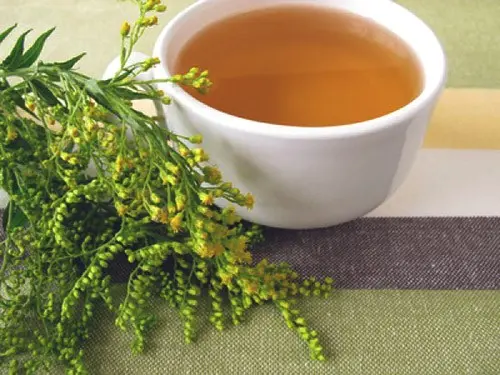
Do not exceed the dosage of natural medicine from goldenrod indicated in the recipe, so as not to worsen the state of health
With cystitis
Regular intake of the plant helps to remove the infection that affects the urinary system, as well as cope with chronic cystitis.
Goldenrod infusion is drunk 4 times a day, 60 ml each, until complete recovery. Also use a solution for douching and sitz baths. Procedures are carried out daily for no more than 10 days.
Instructions for using goldenrod extract for cystitis:
- Assign to children after 12 years and adults.
- Single dose of dry extract 300 mg.
- Drink 4 times a day. The course of treatment is from 5 to 48 days.
If necessary, repeat therapy is carried out, which the doctor prescribes individually.
Goldenrod tincture helps to cope with cystitis. Prepare it from 1 liter of vodka and 14 tbsp. l. chopped plant stem. Insist 3 weeks in a dark place. Drink 5 times a day for ½ tsp. May be diluted with water.
For kidney stones
For the treatment of urolithiasis, 20 g of goldenrod are poured into 240 ml of water heated to 90 ° C. Keep in a water bath for 5 minutes. Insist 3 hours. Then pass through a sieve. Take a decoction of the plant three times a day, 30 ml each.
Goldenrod with ureaplasma
The plant has a powerful anti-inflammatory effect. Therefore, it quickly relieves itching, pain and discomfort that accompanies ureaplasmosis. The antibacterial effect has a detrimental effect on the cause of the disease and destroys bacteria.
To prepare a remedy, 40 g of raw materials are poured into a thermos. Pour 400 ml of boiling water. Leave for 40 minutes. Use 120 ml 4 times a day. Course – 3 weeks.
In glomerulonephritis
Goldenrod is a relatively poisonous plant. Therefore, with glomerulonephritis, it is strictly prohibited.
For skin diseases
Goldenrod is used in cosmetology. Flowers and leaves of the plant are poured with oil. Used as a lotion for burns and wounds.
Infusion daily wash the face in the morning and before bedtime. The procedure helps fight acne, folliculitis, problem skin, enlarged pores and acne.
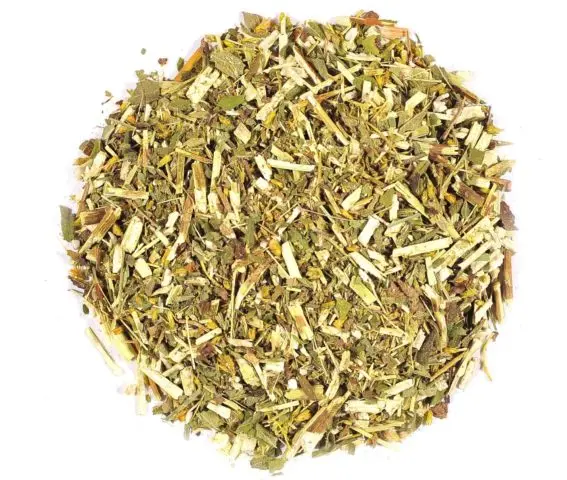
Dried goldenrod is crushed for ease of use.
For cleansing the body
Goldenrod, when used correctly, helps to cleanse the body of toxins. Pour 500 ml of water into a tin. Fall asleep 40 g of dried plant. Cook on low heat for 7 minutes. After that, they remove it from the stove and insist the broth for 3 hours. Take 100 ml with an interval of 4 hours. This recipe also helps to improve the functioning of the digestive tract.
Contraindications to taking goldenrod
Before proceeding with the preparation of a remedy, it is necessary to understand not only the rules for using goldenrod herb, but also possible contraindications. Poisonous substances were found in the composition of the plant, so it is not suitable for treatment for all people. It is forbidden:
- during pregnancy and lactation;
- with glomerulonephritis in chronic and acute form;
- with allergic reactions and individual intolerance.
The use of any remedy based on goldenrod should be agreed with the doctor. In order not to cause harm to health, it is necessary to strictly observe the indicated dosage and not exceed the norm.
The plant can cause side effects and also interact with medications and supplements. Some people develop individual intolerance. With excessive consumption of goldenrod, you may experience:
- stomach ache;
- headache;
- nausea;
- diarrhea;
- loss of consciousness;
- vomiting;
- dizziness.
If these symptoms occur, it is necessary to perform a gastric lavage and consult a doctor. In the future, the plant can not be used for medicinal purposes.
Collection and procurement of raw materials
The plant is harvested at the time of flowering, which occurs from July to September. Rhizomes are harvested only in autumn. The goldenrod is dried, having previously collected it in bunches. Hang out in a draft or in a dark place.
During collection, incompletely blossomed inflorescences are cut off, since during drying they are very fluffy. It is impossible to harvest a plant in a pallet and on a baking sheet. The leaves and stems of goldenrod are very juicy, which provokes the formation of mold. During drying, a constant supply of fresh air must be ensured. The grass should not be exposed to the sun.
You can use the plant in its raw form for treatment. To do this, it is placed in the refrigerator compartment with a temperature of + 2-6 ° C. You can store in such conditions for 21 days.
Dried goldenrod is packaged in small batches in paper bags. Keep no more than 2 years. The room is chosen dry, dark and well ventilated. Temperature regime + 2-35 °С. After this time, the herb loses its healing qualities. It is better to harvest and collect a medicinal plant every year. The fresher it is, the more benefits it brings to the body.
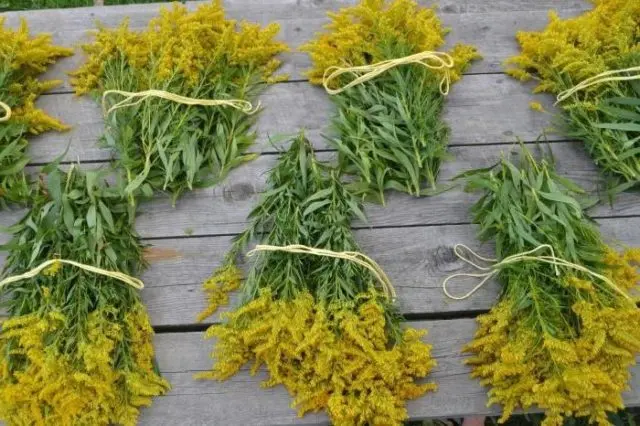
Before drying, goldenrod is collected in bunches and tied
Conclusion
Before use, it is necessary to study the medicinal properties and contraindications of goldenrod. With the right dosage, the plant helps to lose weight, gives the skin youth, relieves inflammation and pain. It is forbidden to use it at the time of exacerbation of renal diseases and with increased pressure.









